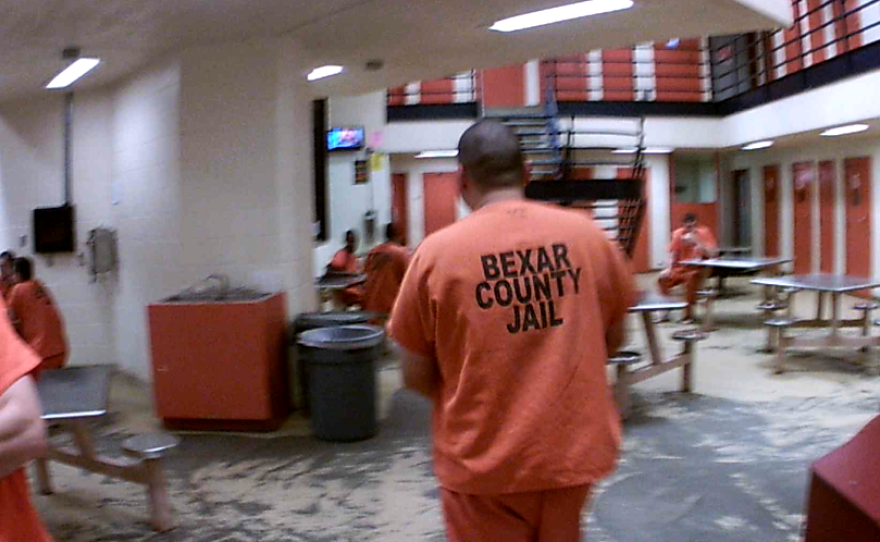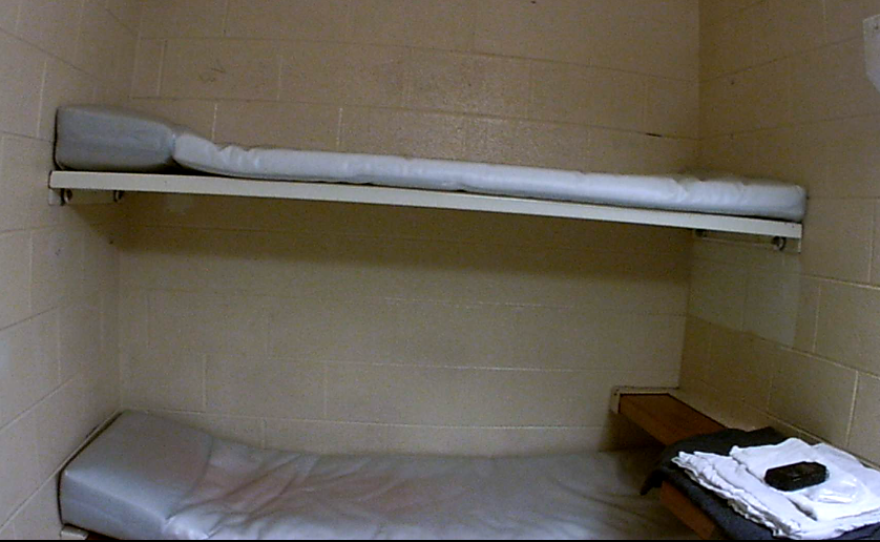Just west of downtown San Antonio, the Bexar County jail looms like a fortress. It's a seven-story building of stained concrete floors, white cinder block walls and brown heavy steel doors that shut and lock with a certainty. It’s an unforgiving place, but it needs to be. It’s built to hold not-nice people against their will.

On any given day more than 4,000 inmates are captive, making it the 16th largest county jail in America. More than 800 of them are dealing with diagnosed mental issues. The challenge for the jail is how to keep the inmates safe when some are determined to kill themselves.
"From the magistrate's office they are brought in here," Lt. Mark Padilla says with a gesture. Finding out who is likely to self-harm is their first challenge.
"They are asking four questions. Have you ever been under mental health care? Do you take any medication? Have you ever seen a doctor for mental health problems? And do you feel suicidal?"
Those questions are asked four times during booking. In booking it’s loud – chaotic and with bright fluorescent lights. The inmates are handcuffed and shackled. Many of these men and women know the routine. But for the first-timers like Richard, this is a nightmare.
"I’m scared to death!" Richard says.
Richard says he never thought he’d end up in jail. He works as a security guard and has been an evidence tech. He says he’s in jail because his brother is accusing him of assault, a charge he flatly denies.
"Don't you need some evidence? The police found no evidence I did the crime."

Richard is like the majority of the people housed in jail. He hasn’t been found guilty. Most people here are awaiting trial or the resolution of their cases. Others have been convicted and given short sentences, had probation revoked or are waiting to be transferred to state prison.
As Richard tells me his story, he’s panicking and the veins in his neck and arms are bulging, so much so that another inmate notices.
"Calmate guey, calmate,"
"Well, I'm just scared."
"Your blood pressure..."
"Well, I'm scared!"
"Look at your arms. Your blood pressure's rising."
Richard says as he was asked the four questions in booking he was so scared that he was tempted to say yes - he was suicidal.

"I was so scared. Ha! Why not? This lady was trying to coach me. She was saying - don't say it. I know you're scared but don't say it. The honest truth, I felt like saying, 'hell, yeah!'"
Had Richard said those words – "I am suicidal" – he says his stay at the county jail would go from bad to even worse.
Instead of being in an open pod with other inmates where he could watch TV, talk with others and work to get released early. He would be placed in the locked-down mental health unit.
“This is the mental health unit – these are acute individuals who are assigned to single man cells. The doctors and the mental health counselors have decided we can not put them in a group setting in a stable mental health unit because they will either be a danger to themselves or others,” Padilla said.
Padilla opens the door of a cell in the mental health unit and the reek of urine hits me in the face. The cell is littered with trash and has two mattresses folded end over end.

It’s a wreck but if someone wanted to commit suicide in here it would be very difficult.
“The lights used to be at a level where you could hang something from. Everything has been retrofitted and moved into the ceiling. It's a higher reach for them,” Padilla explains.
Also, in the ceiling there’s a video camera for 24-hour surveillance. And a guard physically checks each cell every 15 minutes. The bed is no longer metal with opportunities for self-harm – it’s now solid plastic.
Padilla kicks it with his foot. "It's indestructible, and mounted to the floor," he explains.
The air vent grate has also been upgraded to prevent tampering.

But even after all these modifications, if an inmate is exhibiting troubling signs, he can be confined in the padded cell.
Padilla punches the wall with his fist. "This is cushioned - the floor is cushioned. It's been approved by TCJS. Anything that we bring into the system it has to be approved by the Texas Commission on Jail Standards."
It’s a bare room. The walls are made from a beige heavy plastic material with some cushion. If an inmate slammed his head against the wall – they might get a headache but they wouldn’t crack open their own skull.

In this padded cell someone has carved a giant skull into the plastic wall. It looks like the emblem of the Marvel Comic Punisher. The face of the grim reaper with a grim reminder of what these jail guards are trying to prevent.
My night in jail
When that jail cell door closes and locks behind you – the universe suddenly gets very small.
That’s what I recently learned when I was allowed to spend the night in the Bexar County jail.

Melvin McKinney, Victor Casas, Jonathan Campos, and Jesus Jose Lopez; all four of those men committed suicide this summer within a four-week period. They hanged themselves with bed sheets in their cells.
“Any unit is all set up this way,” said Lt. Mark Padilla as he showed me my cell.
“You’re going to have a single man bunk or a double man bunk.”
I knew that this experience wasn’t going to give me all the answers, but I would have a better idea of what the inmates go through.
“These stay where they are and these mattresses have all been sanitized, in case you are wondering,” Padilla said.
I’m issued the standard gear given an inmate: a white cloth sheet that fits over the thin plastic mattress; a flimsy towel; a rough black blanket; and basic toiletries- a mini-toothbrush, toothpaste and a mini-bar of deodorant soap.
The cell has a steel basin with hot and cold running water and an attached steel commode.
The cell door is solid steel with a small glass window. The dark orange paint is worn away in spots. Graffiti is scratched in honoring the heavy metal band Slayer, Satan and assorted profanity.

The guard has the power to remotely unlock cell doors from his station in the middle of the pod. He or she stands there for the 8-hour shift – except for once a week when they have mandatory overtime – then it becomes a 16-hour shift.
“Basically, you have to report that no one is hanging themselves in their cell,” said a guard.
To prevent suicides the guards are required to do periodic safety checks for each cell. They’re called “pipe checks” because the guard carries a computerized metal cylinder that the guard taps against metal receivers mounted around the pod.

Every 55 minutes the guard is required to run a pipe check. Up and down the stairs and across the unit tapping each receiver – looking in each cell along the way. In the suicide prevention unit the checks are every 15 minutes.
But the guards say even with these computer tracked pipe checks inmates who are determined to commit suicide are going to make an attempt.
“In a unit like this I have 50 minute checks that I have to go through and check every cell and look in every cell and make sure no one’s hanging themselves or trying to hurt themselves,” said the guard.

In the first six months of this year guards placed 712 inmates under suicide watch, according to the Bexar County Sheriff’s Office. Last year the number of suicide attempts at the jail hit 1,300.
When I asked inmates about the suicides – they were surprised that the numbers weren’t higher.
“I’ve seen a couple of code blues which is the code for suicide and the last one the dude wrapped a towel the top rail up there. Had it around this throat and ran out his cell and jumped. He bounced off the table pretty hard. I mean, this place sucks. They barely treat us like humans. I’ve been in G.P. (General Population) and I’ve been in trustee. I mean, before I came to trustee, in this pod, we weren’t treated as humans,” said an inmate.

My night in the Bexar County jail was spent in the Alpha Alpha Unit – the pod for low level offenders and trustees. These are the guys who aren’t violent criminals but you wouldn’t want to cross them.
Other pods of about 80 guys are made up of convicted or suspected killers and violent gang members. Their movement is much more restricted and many are in lock-down pods.
The common area has a number of steel tables with four attached stools. This is where the inmates socialize and are given their meals.
“The food we get is horrible. It’s all horrible,” said the inmate.

Three hot meals each day, the food is exceptionally bad. The inmates call it cat food. It’s a mix of potatoes and a soy product. It comes with a piece of corn bread and slice of sweetened bread.
I ate it and it was horrifying. The inmates complained bitterly about the food.
“It’s just three things every day; soy, potatoes and bread. Breakfast is usually oatmeal or grits, potatoes and bread. It’s nasty. It’s not meant to be the Hyatt but we’re still human,” the inmate said.
Despite the bad reviews, they eat it and many tried to get second helpings because that’s all there is to eat. Except for what’s available for purchase at the commissary but that is limited and expensive. A packet of ramen noodles sells for a dollar.
As night comes, the inmates are ordered to rack up. They return to their cells and they are locked in – me included.
“I’m counting down the hours to get out. I just cannot imagine what it would be like to be here day after day after day. I’m here under my own free will and I know I’m going to get out. The walls close in on you. The doors slam. If there is one lesson to be taken away from any of this, it’s jail sucks.”
By sunrise I had had enough. I wanted to get out and back to the free world. What did I gain from my night in jail? I learned enough to know that I wouldn’t want to be there as an inmate. And that the guards here are hard working. They are the single greatest point of contact with the inmates. Having a company of well supervised, highly trained and motivated detention officers is the first line of defense in keeping the inmates safe.











